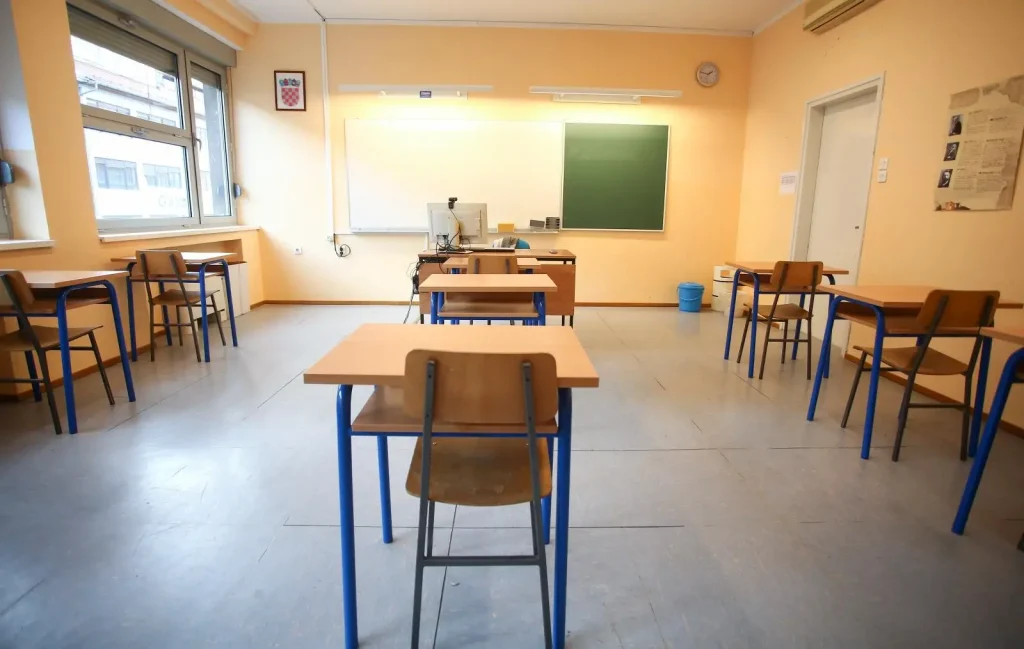It is unlikely, but not impossible, to find someone who wants to study the Croatian language without a particular reason, that is, for the simple fact of learning Croatian. Especially if you are someone with no background in Slavic language learning, it can be quite challenging, and for many even demotivating. Among those who studied the Croatian language out of curiosity, I found Erasmus students from countries such as Poland, Ukraine, or the Czech Republic, and I have also met people from Bosnia, Slovenia, and Macedonia, who despite speaking different languages, studied Croatian without problems or spoke it very fluently in very little time.
It was not the case of my colleagues from countries like Italy, Spain, Portugal, England, or France. Neither was it for me, from Peru, nor my friends from Argentina, Chile, Bolivia, or Colombia, of which the vast majority studied the language as part of the scholarship offered by the Central Office of the State for Croats outside the Republic of Croatia, with the intention of learning more about the country of their ancestors or taking the first steps within their new life project in Croatia. Our vocabularies, grammar rules, and even alphabets may be relatively similar, but they are very different from those of the Slavic languages. Along the way, one notices that certain words can be shared and thus help to understand in a certain way the context of what is heard or read, but by no means reveal their full meaning.
Some examples are:
- situation (English) – situación (Spanish) – situacija (Croatian)
- politician – político – političar
- museum – museo – muzej
- linguistics – linguística – lingvistika
On the other hand, as in Croatian, we also conjugate verbs almost exclusively for each noun according to whether it is first, second or third person, or if it is singular or plural. While in English it is possible that verbs change very little under these same considerations.
For example, with the verb eat:
In English (to eat):
- I eat.
- You eat.
- (He/she/it) eats.
- We eat.
- You eat.
- They eat.
In Spanish (comer):
- Yo como.
- Tú comes.
- (Él/ella) come.
- Nosotros comemos.
- Ustedes comen.
- Ellos comen.
In Croatian (jesti):
- Ja jedem.
- Ti jedeš.
- On/ona/ono jede.
- Mi jedemo.
- Vi jedete.
- Oni/one/ona jedu.
Those of us who speak Spanish could say that, in a certain way, there are reasons to accommodate ourselves to the study of the Croatian language from certain angles, such as the fact that our language also has a large number of grammatical rules and conjugations, as well as the presence of the genres. However, the Croatian language has declensions, which do not happen in Spanish. For instance:
- La ciudad. (The city) – Grad (Case: Nominativ)
- Me voy a la ciudad. (I’m going to the city) – Idem u grad. (Case: Akuzativ)
- Vivo en la ciudad. (I live in the city) – Živim u gradu. (Case: Lokativ)
- Junto a la ciudad. (Next to the city) – Pored grade. (Case: Genitiv)
- Él debatirá con la ciudad. (He will debate with the city) – Raspravljat će s gradom. (Instrumental)
As you can see, in Spanish, the noun city does not change in its form while the case does, but in Croatian, the noun changes its form according to declension. Although I mentioned earlier that in Spanish, as in Croatian, nouns can also be classified by gender, this does not affect the way the verbs that accompany them are conjugated. For instance:
- Él fue a la ciudad. (He went to the city) / Ella fue a la ciudad. (She went to the city) – Otišao je u grad. / Otišla je u grad.
Also, we are not very used to putting together sentences where nouns are not accompanied by articles. For example:
- A ellos les gusta la pizza. (They like pizza) – Vole pizzu.
However, some things may be familiar to those who speak English, as the articles next to the nouns are in many cases dispensable, as in the example above. But even if a few little things may favor those who speak English, in the end, they will find themselves entangled in a language laden with declensions and gender, contrary to the neutral language they possess.
Now, I am not a linguistics student, much less an expert, so I do not dare to analyze or delve further into the history and rules of each language. However, and taking into account the advantages and obstacles that can arise when learning a language as challenging as Croatian, I think there are five ways in which you can learn it not only faster and with greater ease, but also in an entertaining way.
1. Enroll in a course to learn the Croatian language
Probably the best alternative, enrolling in a course to learn the Croatian language has many advantages. For example, as you progress through the topics and levels, you will have the opportunity to consult with your teacher, usually someone born in Croatia, about something that you have not understood well or something about which you need more information regarding the Croatian language. Also, the homework assignments and tests that you have to take throughout the course will help you put your learning to the test. You will also have study material that you may not find elsewhere, and you will study with colleagues who probably have the same level as you and in whom you will find support. If you are interested in studying the Croatian language in Croatia, you can review the bases to apply for the Croatian language course scholarship in the Republic of Croatia, or you can also review the courses offered by the Croaticum in Zagreb.
2. Practice with your friends or partner from Croatia
The good thing about having a Croatian-born partner, or Croatian friends, is that you don’t need to live in Croatia to practice or continue learning the language. If that person is willing to teach you, and you commit to studying, you will notice that it can be very easy and entertaining. Since they were born in Croatia, you will not only learn grammar rules and declensions, but you will also be able to learn pronunciation. Chances are that they will surely appreciate your interest in learning the language!
3. Be encouraged to speak Croatian in everyday situations
If you live in Croatia, or even if you study the Croatian language there, I can tell you that it is probably not enough to do summaries in your notebook, assignments, exams or many hours of study. In the end, if you are studying a language it is precisely so that you can speak it. It is best to avoid intermediary languages as much as possible. Although in Croatia you will realize that English is spoken by a large part of the population, encourage yourself to practice what you know of Croatian when shopping, at the post office, in a cafe, in the bar, or even with strangers on the street! And there are two reasons why you will love this option. The first reason is that you will gain more confidence to speak Croatian, and the second is because Croatians are aware that their language can be complicated, so they will help you with what you do not know well and will motivate you to continue improving.
4. Watch movies or series with Croatian audio or subtitles
When I arrived in Croatia, several of my Croatian friends recommended me to watch Croatian movies or series, and at first, I thought that it could be a bit cliché and that it might not help me much to learn the language. Yes, it is true that when watching a Croatian movie or series you will not be able to decipher the declensions or understand the grammar rules, but it will help you to associate some expressions, phrases, or common words used by Croats. I would recommend that you first watch movies with audio in your native language or in English, but with Croatian subtitles. Then, try watching movies or series with Croatian audio, and with subtitles in your native language or in English. This way you will practice not only your vocabulary but also your pronunciation and the contexts in which you can use new expressions in Croatian.
5. Change the language of any of your electronic devices
Today, smartphones and other electronic devices have become essential tools to learn a new language or function during a trip abroad. For example, Google Translate works very well for translating from English to Croatian and vice versa, and it continues to improve over time. Nowadays, it allows you not only to translate words or sentences that you write yourself, but you can also upload photos or scan a text in Croatian, and the application will translate it for you very effectively. On the other hand, the latest iPhone and its operating system allow you to detect texts through your camera and even in your photographs, and that way you can achieve results very quickly.
However, my main advice is to change the main language of your phone, at least from time to time. As we are very aware of our phones through social networks or work, it is likely that we have already become accustomed to frequent texts and messages that we see on different platforms: ”send message”, ”log out”, ”update”, ”download video”, ”share image”, ”like”, ”comment”, etc. Once your phone is in another language, you will find the same messages, but this time in Croatian, and with time you can get used to it!
The Croatian language is difficult, but not impossible. Once you find the trick, you will realize that it is a language very rich in history and you will find pleasure and motivation to learn it. Do not be discouraged!
For more on lifestyle in Croatia, follow TCN’s dedicated page.











